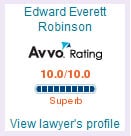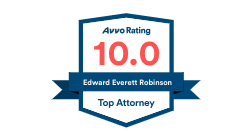Milwaukee, Wisconsin injury lawyer Edward Robinson graduated with honors from University of Wisconsin-Madison Law School, where he served as a Note & Comment Editor for the Wisconsin Law Review. He graduated magna cum laude from Marquette University, where he was a member of the Phi Beta Kappa, Alpha Sigma Nu, and Phi Alpha Theta honor societies. In addition to his victories in court, Mr. Robinson has been honored by several nationally recognized organizations, including being selected by his peers for membership in the American Board of Trial Advocates, being selected every year since 2011 to The Best Lawyers in America, and being selected every year since 2009 to the Wisconsin Super Lawyers.
Author
- “Civil Jury Verdicts: The Five-Sixths Requirement in Wisconsin,” Inside Track, State Bar of Wisconsin (2021)
- “Navigating Medicare & Medicaid: Preventing Claim Piracy,” (Co-author), THE VERDICT (Spring 2015).
- “Headaches and Hurdles – Hospital Liens, Medical Bills, and Lien Reductions,” (Co-author), THE VERDICT (Fall 2013)
- “Adverse Examinations” THE VERDICT (Winter 2013)
- “Medicare Liens and the Ethics of Attorney Indemnification” (Co-author), THE VERDICT (Spring 2013)
- “Effective Use of Certified Medical Records at Trial” THE VERDICT (Winter 2012)
- “A Survey of the Top Four Recent Supreme Court Decisions” THE VERDICT (Fall 2012)
- “Post Orlowski” (Co-author), THE VERDICT (Spring 2012)
- “Fischer v. Steffens: A Frontal Assault On The Made Whole Doctrine” (Co-author), THE VERDICT (Winter 2011)
- “Minor Settlement Do’s and Don’ts” (Co-author), THE VERDICT (Fall 2011)
- “A Practical Guide To Conducting A ZMET Focus Group For $979.95” (Co-author), THE VERDICT (Fall 2011)
- “Lawyers Respond to Genrich Decision, Court erred with wrongful death decision” Wisconsin Law Journal (2009)
- “Conducting The Direct Examination Of A Treating Doctor” THE VERDICT, Vol. 31:3. (Summer 2008)
Presentations
- Annual Torts Update. Wisconsin Association for Justice (July 2024)
- Sexual Misconduct By The Police: § 1983 Claims, Monell Claims, and Indemnification, Outagamie County Bar Association (November 2023)
- 46th Annual Torts Update, Recent Decisions Addressing Reducing Clauses, State Bar of Wisconsin (September 2023)
- Annual Torts Update. Wisconsin Association for Justice (July 2023)
- 45th Annual Torts Update, Cost of Obtaining Medical Records, State Bar of Wisconsin (September 2022)
- Annual Torts Update. Wisconsin Association for Justice (July 2022)
- 45th Annual Torts Update, Ethical Questions and the Judiciary, State Bar of Wisconsin (September 2022)
- Annual Torts Update. Wisconsin Association for Justice (July 2021)
- Civil Litigation Motion Practice From Start to Finish: A View From the Bench (panelist), State Bar of Wisconsin Annual Meeting & Conference (June 2021)
- Annual Torts Update. Wisconsin Association for Justice (July 2020)
- Annual Torts Update. Wisconsin Association for Justice (July 2019)
- 41st Annual Torts Update, Presenting a UIM Claim: What to Do and How to Do it, State Bar of Wisconsin (September 2018)
- Annual Torts Update. Wisconsin Association for Justice (July 2018)
- Annual Torts Update. Wisconsin Association for Justice (July 2017)
- Tort & Technique Update Seminar, Torts Update. Wisconsin Association for Justice (October 2016)
- 39th Annual Torts Update, Preventing A Defective Verdict: Wisconsin’s Five-Sixths Rule, State Bar of Wisconsin (September 2016)
- Annual Torts Update. Wisconsin Association for Justice (July 2016)
- Annual Torts Update. Wisconsin Association for Justice (July 2015)
- 37th Annual Torts Update, Legislative Update, State Bar of Wisconsin (September 2014)
- Annual Torts Update. Wisconsin Association for Justice (July 2014)
- Annual Torts Update. Wisconsin Association for Justice (July 2013)
- 35th Annual Torts Update, Uninsured and Underinsured Motorist Coverage. State Bar of Wisconsin (September 2012)
- Annual Torts Update. Wisconsin Association for Justice (July 2012)
- 34th Annual Torts Update, Uninsured and Underinsured Motorist Coverage and the Repeal of Truth in Auto Legislation. State Bar of Wisconsin (September 2011)
- Annual Torts Update. Wisconsin Association for Justice (July 2011)
- Repeal, Amend, Renumber, and Create: Tort Reform Under 2011 Wisconsin Act 2. State Bar of Wisconsin, Webinar (2011)
- Annual Torts Update. Wisconsin Association for Justice (July 2010)
- Tort & Technique Update Seminar. Wisconsin Association for Justice (October 2009)
- 32nd Annual Torts Update, Safe Place Statute, Wrongful Death and Strict Liability. State Bar of Wisconsin (September 2009)
- Annual Torts Update. Wisconsin Association for Justice (July 2009)
- Civil Law Seminar, Fundamentals of a Subrogation Claim Post Muller, Panel Discussion with The Honorable Paul Reilly and James Friedman. Wisconsin Supreme Court (December 2008)
- Evidence: Strategies for Finding, Preserving and Using Evidence to Support Your Case. National Business Institute (October 2008)
- Annual Torts Update. Wisconsin Association for Justice (July 2008)
- 30th Annual Torts Update, Pleadings, Practice and Summary Judgment. State Bar of Wisconsin (September 2007)
- Governmental Immunities: What is Discretionary–What is Ministerial? Wisconsin Academy of Trial Lawyers (December 2006)
- The Availability of Sec. 628.46 Interest in Third Party Liability Cases After Kontowicz v. American Standard. Wisconsin Academy of Trial Lawyers (October 2006)
- As Clear as Mud: Wisconsin Subrogation Law & The Collateral Source Rule. Wisconsin Academy of Trial Lawyers (March 2006)
- Bad Faith Insurance Claims in Wisconsin. National Business Institute (2006)
- Winning Your First Civil Trial in Wisconsin: What They Didn’t Teach You in Law School. National Business Institute (2006)
- Getting the Most Out of Your Evidence During Wisconsin Personal Injury Trials. National Business Institute (2005)
- Handling Damages in Personal Injury Cases. Professional Education Systems Institute, LLC (2005)
- Dealing With Other Self-Insured Plans: Ruckel v. Gassner. Wisconsin Academy of Trial Lawyers (December 2004)
- How to Maximize or Minimize Personal Injury Damages, Plaintiff’s Perspective on Developing and Proving Damages. Professional Education Systems Institute (2003)
- 20th Annual Torts Update, Recent Developments In Constitutional Law. State Bar of Wisconsin (September 2000)
Client Testimonials
“Having never been in a major accident, I wasn’t completely sure what to expect. It didn’t take long for the feelings of being overwhelmed to settle in. I can’t say enough great things about working with Ed Robinson and Kendra Searing. Their transparency professionalism, responsiveness, and experience helped to make a difficult situation light years easier.
They were sensitive to the details of the situation, but also realistic about the expectations. I’m sure on the spectrum of accidents they’ve seen, I was a small fish, but they never made me feel like I was a business transaction or not worthy of their time. I would absolutely recommend having a conversation with them should you ever find yourself in need of personal injury advice or services.” – Courtney B.
“My husband & I worked Attorney Robinson & he was absolutely amazing. He came to the hospital within a day of calling to set up the consultation & continued to check in on my husband throughout his recovery. He would call on the weekends to give us an update & was nothing but upfront & honest with us about our case. He genuinely cares about his clients. He is hands down the best attorney in the industry that handles personal injury cases.” – Bekki C.
“I never write reviews, but Ed Robinson exceeded my expectations. Would definitely consider Ed a “Super Attorney”. He is professional, compassionate and cares about his clients. Went above and beyond negotiating my settlement and regularly followed-up with me. If you are in need of an expert attorney, contact Attorney Ed Robinson.” – Ismael C.
“Ed Robinson exceeded my expectations, not only in the resulting settlement, but throughout the entire process. As a minor when the claim started, finding the right attorney and filing a law suit was extremely intimidating. Ed is kind, professional, and enjoyable to talk with. When my case went to trial, Ed blew the jury away and made it easy for them to rule in our favor…quickly! Going to trial could have been a horrible experience, but Ed and Kendra were patient, experienced, and made me feel comfortable from the start. Look no further if you are in search of an attorney. I don’t know how Ed does it- he is simply the best!” – Michelle W.
“In the unfortunate event that you find yourself suffering from the repercussions of an accident, I highly recommend you seek Atty. Edward Robinson. He is an amazing attorney! He is extremely smart and determined to help you. When I was recovering from my car accident, he was there EVERY STEP of the way to fight for me. He completely understood my pain and struggle, physically and with that of the opposing insurance company who refused to do what was right. He gave sound advice and helped me to receive a fair and just compensation for my past and future medical bills! I completely trust him, his judgment, and his extensive legal knowledge.” – Renee R.
Representative Cases
Kontowicz v. American Standard Ins. Co., 2006 WI 48, 290 Wis. 2d 302, 714 N.W.2d 105.
In this case, our client’s spinal cord was severed and she was rendered a quadriplegic as a result of an automobile accident caused by the negligence of American Standard’s 16-year-old insured. Immediately prior to the crash, he was operating the Pontiac Firebird that his parents bought him at an estimated speed of 89 mph in a 35 mph zone. He crashed into the rear-end of our client’s car, and pushed her off of the road and into a utility pole. Her spinal cord was severed as a result of the impact. American Standard’s liability limits were only $500,000. Even though American Standard concluded within one week of the crash that it should pay those limits once it confirmed our client’s injuries, it did not pay those limits until nearly 16 months later. After American Standard finally paid its limits, we brought a motion before the circuit court seeking to recover interest from American Standard pursuant to Wis. Stat. § 628.46, the “timely payment of claims statute,” based on its failure to timely pay our client’s claim. That statute requires insurers to pay a claim within thirty days of being presented with proof of loss or equivalent evidence of such loss. Where an insurance company fails to timely pay a claim absent reasonable proof to deny its responsibility, interest starts running at the rate of 12% per year and continues to run until such time as the insurer finally pays the claim. In a case of the first impression, the Wisconsin Supreme Court agreed with us that § 628.46 is not limited to first-party claims but rather applies equally to third-party claims. The Wisconsin Supreme Court accordingly upheld the circuit court’s assessment of interest against American Standard.
Dilger v. Metropolitan Property & Casualty Ins. Co., 2015 WI App 54, 364 Wis.2d 410, 868 N.W.2d 167.
In this case, our client, a City of Brookfield police officer, was struck by a hit-and-run driver shortly after midnight while responding to a call and proceeding on foot within a designated bicycle lane alongside West North Avenue. Our client sustained significant injuries that eventually forced him to leave his career as a police officer. The hit-and-run driver, who had been out drinking before the collision, turned herself in three days later but claimed she thought she struck a deer. She had underlying liability limits through Metropolitan of $500,000, and a $1 million umbrella liability policy. We subsequently filed suit on behalf of our client against the hit-and-run driver and Metropolitan. Metropolitan eventually agreed to pay its $1.5 million policy limits. The driver also made a personal payment of $40,000. All claims were then dismissed with the exception of our client’s claim for interest under Wis. Stat. § 628.46, the “timely payment of claims” statute. An initial demand for payment of the underlying $500,000 policy limits was made in May 2011, and, later, after our client’s medical treatment progressed, a demand for the full $1.5 million policy limits was made in February 2012, yet Metropolitan delayed paying the claim until February 2013. The trial court agreed with us that based on this delay in paying, Metropolitan owed statutory interest under Wis. Stat. § 628.46 and awarded $178,191.78 in statutory interest. Referring to this case as the “follow-up” to Kontowicz, the Court of Appeals affirmed the trial court. The Court of Appeals rejected Metropolitan’s argument that questions of liability remained even after its insured was convicted of hit-and-run, including “the degree of negligence that could be ascribed” to Metropolitan’s insured. Instead, the Court held that the proper standard of review to be applied was whether the trial court’s finding was against “the great weight and clear preponderance” of the evidence, and, applying this standard, the trial court’s finding was not clearly erroneous. The trial court found that Dilger had asserted estimates of damages that “far exceeded Metropolitan’s policy limits, regardless of any potential contributory negligence on Dilger’s part,” and the insured’s guilty plea showed that she “bore the ‘vast majority of liability.’” ¶15.
Oden v. City of Milwaukee, 2015 WI App 29, 361 Wis. 2d 708, 863 N.W.2d 619.
In this case, our clients—a mother and her young son—suffered significant burn injuries when their home in the City of Milwaukee exploded due to a natural gas leak. In the early morning hours of February 1, 2009, multiple residents in the 2400 block of North 10th Street in the City of Milwaukee called 911 to report a strong odor of natural gas. Milwaukee police officers and firefighters responded to these calls, and upon arrival, confirmed a “strong odor of gas throughout the block,” and observed “a gas break in the street” which was bubbling up. We Energies (the natural gas utility) was notified but the homes on the block were not evacuated. Instead, after contacting We Energies, all firefighters left and returned to their stations, leaving police officers behind to await the arrival of We Energies representatives. Our clients’ home blew up approximately 1 ½ hours after the first 911 call, and 1 hour after the firefighters left the area. The cause of the explosion was later determined to be the underground migration of natural gas from a break in the main line under the street into the basement of our clients’ home, where the gas fumes accumulated until eventually ignited by the pilot light of their furnace. ¶¶2-5. Unfortunately for them, neither the firefighters nor gas company representatives evacuated them from their home or even warned them that they were in any danger. After the explosion, firefighters returned to the neighborhood, and a full-scale evacuation was ordered. We filed a lawsuit on behalf of our clients against We Energies and the City of Milwaukee. We eventually settled our clients’ claims against We Energies, but continued with their claims against the City. The circuit court ultimately granted the City’s motion for summary judgment, ruling that the police officers and firefighters were entitled to discretionary immunity. ¶10. We appealed and were successful in getting the Court of Appeals to reverse the circuit court’s decision and reinstate our clients’ claims against the City. The Court of Appeals held that the circuit court erred in dismissing our clients’ claims, for two separate reasons. First, the Court of Appeals determined that the City did have a ministerial duty to evacuate the residents in light of the natural gas leak because the Milwaukee Fire Department had adopted We Energies’ first-responder handbook for training its firefighters as to how to respond to natural gas leaks, and the firefighters had violated that training and handbook by not evacuating the residents. ¶¶14-17. Secondly, the Court of Appeals agreed with us that the “known present danger” exception to discretionary immunity also applied to preclude summary judgment, concluding that “[t]here is no doubt that the gas leak here was extremely dangerous, more than unsafe,” and, therefore, the firefighters had a ministerial duty to evacuate the affected residents. ¶19.
Hunt v. Clarendon National Insurance Service, Inc., 2005 WI App 11, 278 Wis. 2d 439, 691 N.W.2d 904
In this case, our ten-year-old client was struck by a car and injured after she was dropped off on the corner by her school bus. Under the “drop-and-go” policy of the defendant school bus company, school children who reside within the City of Milwaukee are dropped off by the bus on the corner and told to wait until the bus departs to cross the street. Under this policy, the defendant school bus company and its drivers do not assist the children in crossing the street. By contrast, in rural areas, school buses do not drive away after dropping off children but rather remain at the stops so that the drivers can assist the children in crossing in front of the bus. Once the bus pulled out into the intersection, our client started to cross the street behind the bus in the crosswalk. Unfortunately, the bus stopped in the intersection to make a left turn, and obstructed our client’s view of oncoming traffic. Although the bus driver saw an approaching vehicle, he did not honk his horn or do anything to attempt to warn the approaching motorist of the presence of our client, or to warn our client of the approaching car. We argued that the defendant school bus company is a “common carrier,” and, accordingly, was required to exercise the highest degree of care. We argued further that the defendant’s “drop-and-go” policy was inherently deficient and in violation of its “common carrier” duty of care. The circuit court disagreed with us, and refused to instruct the jury as to the defendant’s “common carrier” status and duties. On appeal, we successfully obtained a new trial. The Wisconsin Court of Appeals agreed with us that school buses are “common carriers,” and therefore required to exercise the highest degree of care. Upon retrial, we obtained a favorable verdict against the school bus company on behalf of our client.





